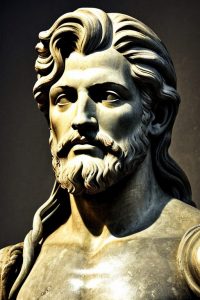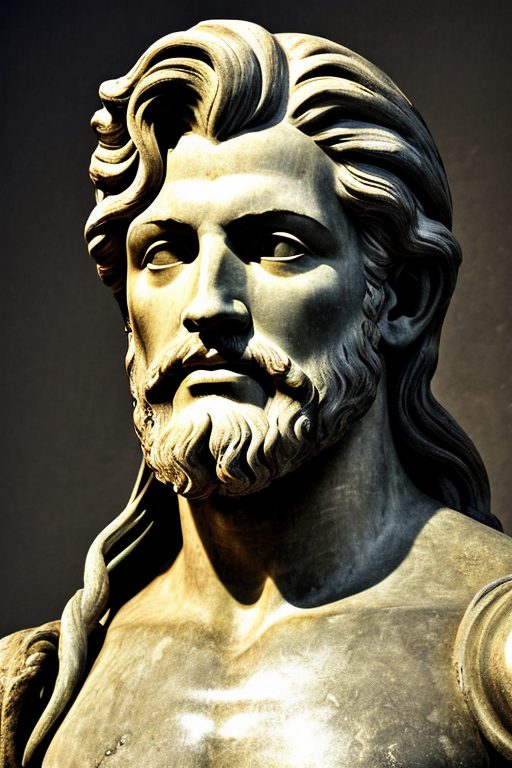Please share my lesson using your social media platforms. Use the links above.
Student FREE Bookstore (CLICK HERE)
https://www.fiverr.com/s/YDrPkl
The Greek God Poseidon (Neptune)
INTRODUCTION:
Poseidon, the Greek God of the sea, storms, and earthquakes, has had a long and rich history in Greek mythology. The mighty Poseidon was the son of Cronus and Rhea and had five siblings, including Zeus and Hades. The three brothers divided the world among themselves: Zeus as the God of the sky, Hades as the God of the underworld, and Poseidon taking dominion over water. 
NEW VOCABULARY: storms, earthquakes, mythology, mighty, siblings, divided the world, underworld, dominion
SECTION ONE:
In ancient times, Poseidon was thought to have been a powerful force that had shaped countless islands and coastal regions of Greece through his power over water. His ability to stir up tidal waves or calm seas was widely believed to have contributed to the peculiar geography of islands such as Crete and Sicily.
Poseidon has played a vital role in several mythological episodes, often showcasing his wrath. For instance, he had once contested for Athens with Athena, both desiring the city as their own. Still, Athena won by creating an olive tree that demonstrated her superior skills. After losing this contest to Athena, Poseidon often expressed his anger by sending storms and floods to plague the people onshore.
NEW VOCABULARY: ancient times, powerful force, shaped countless islands, coastal, ability, to stir up, tidal waves, peculiar, played a vital role, showcasing, wrath, contested, desiring, olivetree, superior skills, expressed, floods, plague, onshore, offshore
SECTION TWO:
In another instance from Homer’s epic poem The Odyssey, Poseidon showcased his wrath at Odysseus when he blinded Polyphemus—one of Poseidon’s sons—during his journey home after fighting in the Trojan War. In retaliation, Poseidon cursed Odysseus’ voyage across the sea by causing storms and shipwrecks that hindered him from returning home for years.
Throughout history, Poseidon has married several times. He is most well-known for being married to Amphitrite, a sea nymph who bore him three children: Triton (a merman), Rhode (a sea nymph), and Benthesicyme (a goddess).
NEW VOCABULARY: instance, epic, blinded, retaliation, cursed, shipwreck, hindered, sea nymph, bore
SECTION THREE GRAMMAR ONE:
Examples of perfect tenses in English grammar:
- Present Perfect: Poseidon has been an influential figure in numerous mythological stories.
- Past Perfect: Before Zeus and Poseidon began their dispute over Athens, they had shared a cordial relationship.
- Future Perfect: By the time the Athenians erect a new shrine dedicated to Poseidon, his presence will have already influenced their seafaring traditions.
WRITE:
Write a short 100 word paragraph about what you did last weekend. Use one example of each of these grammar concepts. Present Perfect, Past Perfect & Future Perfect.
SECTION FOUR:
The history of Poseidon extends far into the ancient Greek myths, weaving tales of power, wrath, and control over seas and earthquakes. This mighty god was a vital figure in Greek mythology whose tales continue to captivate the imagination and provide insight into the rich history and culture of ancient Greece.
NEW VOCABULARY: weaving, tales, wrath, vital, figure, Greek, mythology, captivate, insight
SECTION FIVE: ADVANCED GRAMMAR TWO: QUESTIONS.
Here are ten advanced English grammar questions with the theme of Greek gods:
1. In the sentence “Zeus is known as the ruler of all gods and humans in Greek mythology,” identify the subject, predicate, and direct object. WHAT IS A PREDICATE? It’s the part of a sentence or clause containing a verb and stating something about the subject (e.g. went home in John went home).
2. Correct any agreement errors in the following sentence: “Apollo, the god of music, healing and light, were often depicted carrying a golden bow and lyre.” WHAT IS AN AGREEMENT ERROR? A subject/verb agreement error occurs when the subject and verb of a sentence do not agree in number.
3. Transform this sentence into passive voice: “The gods banished Hades to rule over the underworld.”
4. Identify any misplaced or dangling modifiers in this sentence: “Athena, the cunning goddess of wisdom, helped many heroes on her shining armor.” WHAT ARE MISPLACED OR DANGLING MODIFIERS? Both terms refer to modifiers that are connected to the wrong thing in a sentence. A misplaced modifier is too far away from the thing it’s supposed to modify, while a dangling modifier’s intended subject is missing from the sentence altogether.
5. Create a complex sentence using both a dependent and an independent clause to describe Ares, the god of war.
6. Rewrite the following sentence using appropriate parallel structure: “Poseidon had a powerful trident, could cause earthquakes, and storms.”
7. Replace all instances of weak or generic phrasing with more specific language in this statement: “Hermes moved around quickly.” WHAT ARE WEAK OR GENERIC PHRASES? They are phrases that are a little unimaginative. Find better, more interesting ways to say something.
8. Identify and correct issues with punctuation and clarity in this sentence: “Dionysus, was known for wine-making; parties mystery cults which incorporated intoxicating substances.” CORRECT THE PUNCTUATION ERRORS.
9. Combine these sentences using a relative clause: “Demeter is the goddess of agriculture. She searches for her daughter Persephone every year.”
10. Correct any run-on sentences or fragments in this passage: “Aphrodite was born out of sea foam she is the goddess of love and beauty relationships; desire.” WHAT IS A RUN-ON SENTENCE AND FRAGMENT? A “run-on” can be seen as a sentence containing too many complete thoughts without the proper punctuation or connectors, sentence fragments have the opposite problem. They may have a missing subject or verb or maybe an incomplete thought.
VIDEO LISTENING SECTION:
QUESTIONS:
-
-
-
- What was Poseidon’s other name?
- Where did Poseidon live?
- Who did Poseidon marry? What was her name.
- His wife had many affairs and had bastard children. What is a bastard child?
- What was Poseidon’s nieces name and what city was named after her?
-
-
GRAMMAR QUESTION ANSWERS:
1. Subject: Zeus; Predicate: is known; Direct object: ruler of all gods and humans in Greek mythology.
2. “Apollo, the god of music, healing, and light, was often depicted carrying a golden bow and lyre.”
3. “Hades was banished to rule over the underworld by the gods.”
4. “Athena, the cunning goddess of wisdom, helped many heroes while wearing her shining armor.”
5. “Ares, the god of war, displayed a fierce demeanor in battle, even though he sometimes suffered humiliating defeats.”
6. “Poseidon had a powerful trident, could cause earthquakes, and commanded storms.”
7. “Hermes darted around with exceptional swiftness.”
8. “Dionysus was known for wine-making; he hosted parties and presided over mystery cults that incorporated intoxicating substances.”
9. “Demeter, who searches for her daughter Persephone every year, is the goddess of agriculture.”
10. “Aphrodite was born out of sea foam; she is the goddess of love, beauty, relationships, and desire.”


